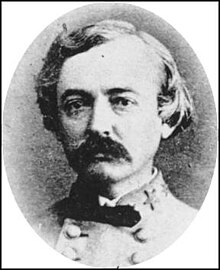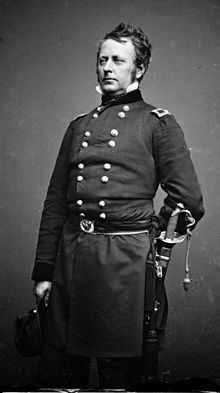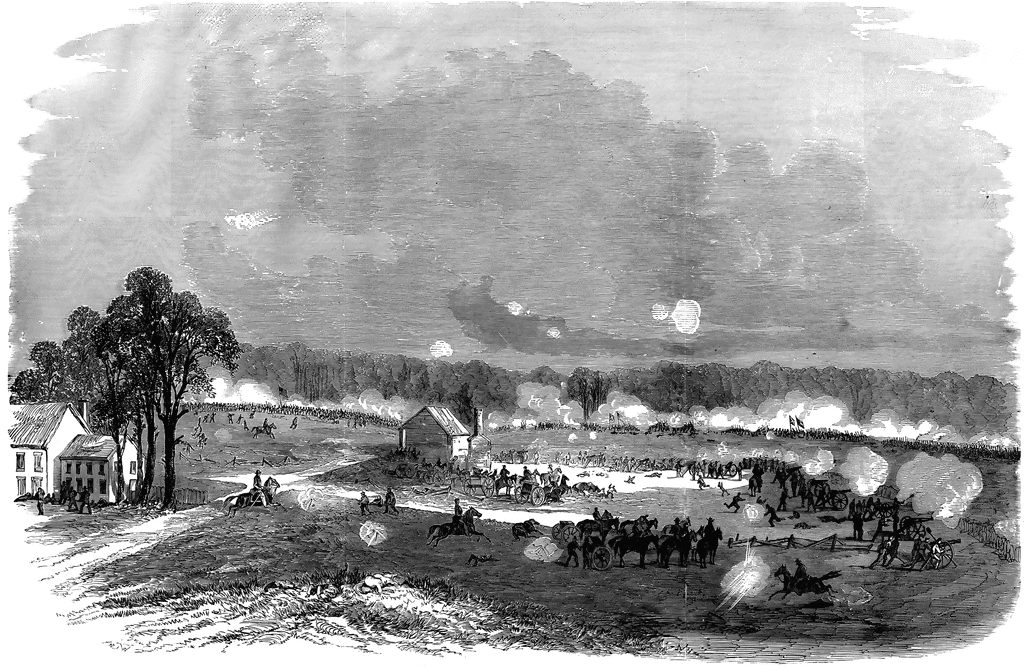 |
| Plank Road and Ely's Ford (etu.usf.edu) |
HEADQUARTERS ARMY OF THE POTOMAC,
May 1, 1863-6.35 a. m.
General JOHN SEDGWICK and JOHN F. REYNOLDS:
The commanding general is very anxious to have frequent and full information of any movements of the enemy in your front.
S. WILLIAMS,
Assistant Adjutant-General.
HEADQUARTERS LEFT WING,
May 1, 1863-8.35 a. m.
Major-General BUTTERFIELD,
Chief of Staff:
General Reynolds reports enemy in same position in his front, as far as he can learn. Fog so thick nothing can be done except to be ready to meet an attack. Scouts report a movement to our left, but this is not very reliable; supposed to be picket relief merely.
General Brooks reports nothing new in his front. No diminution nor change in the enemy's picket line. The balloon has not gone up on account of the fog.
JOHN SEDGWICK,
Major-Genera, Commanding Left Wing.
BALLOON IN THE AIR,
May 1, 1863-9.15 a. m.
Major-General SEDGWICK:
GENERAL: Heavy columns of the enemy's infantry and artillery are now moving up the river, accompanied by many army wagons, the foremost column being about opposite Falmouth and 3 miles from the river. Thee is also a heavy reserve on the heights opposite the upper crossing, and all the rifle-pits are well filled.
Very respectfully, &c.,
T. S. C. LOWE,
Chief of Aeronauts, Army of the Potomac.
BALLOON IN THE AIR,
May 1, 1863-11 a. m.
Major-General SEDGWICK,
Commanding Left Wing, Army of the Potomac:
GENERAL: I can see no earthworks on the Bowling Green road.
Should judge that the guns had been taken from the earthworks to the right of Fredericksburg.
Another train of wagons is moving to the right, on a road about 1 mile from beyond the heights opposite Franklin's crossing.
The enemy's barracks, opposite Banks' Ford, are entirely deserted.
The largest column of the enemy is moving on the road toward Chancellorsville. The enemy on the opposite heights, I judge, considerably diminished.
Can see no change under the heights and in the rifle-pits.
I can see no diminution in the enemy's tents.
Very respectfully, your obedient servant,
T. S. C. LOWE,
Aeronaut.
CHANCELLORSVILLE,
May 1, 1863-11.30 a. m.
General BUTTERFIELD:
Direct Major-General Sedgwick to threaten an attack in full force at 1 o'clock and to continue in that attitude until further orders. Let the demonstration be as severe as can be, but not an attack.
JOSEPH HOOKER,
Major-General, Commanding.
(Telegraphed to General Sedgwick, 5.05 p. m.)
BALLOON IN AIR, NEAR HEADQUARTERS,
May 1, 1863-Noon.
General HOOKER:
GENERAL: I can see no earthworks on Bowling Green road. Should judge the guns had been taken from earthworks to right of Fredericksburg. Another train; wagons moving to right, on road about 1 mile from beyond heights, opposite Franklin's crossing. Enemy's barracks opposite Banks' Ford are deserted. Largest column of enemy is moving on road toward Chancellorsville. The enemy on opposite heights, I judge, considerably diminished. Can see no change under the heights and rifle-pits. No diminution int he enemy's tents.
T. S. C. LOWE.
BALLOON IN THE AIR,
May 1, 1863-12.30 p. m.
Major-General SEDGWICK,
Commanding Left Wing, Army of the Potomac:
GENERAL: In a west-northwest direction about 12 miles, an engagement is going on. Can see heavy smokes and hear artillery. In a west-southwest direction about 4 miles, artillery is moving toward the engagement. A large force of the enemy are now digging rifle-pits, extending from Deep Run to down beyond the lower crossing, just by the edge of the woods at the foot of the opposite heights. There are but few troops in sight now, except those manning batteries and in the rifle-pits. There appears to be a strong force in the rifle-pits.
Very respectfully, your most obedient servant,
T. S. C. LOWE,
Chief of Aeronauts, Army of the Potomac.
MAY 1, 1863-12.50 p. m.
General SEDGWICK:
GENERAL: The enemy have advanced their skirmishers to the river in front of this place, and now occupy the rifle-pits. They are also advancing their skirmishers across the field to my right. I can see nothing south of the Massaponax.
T. S. C. LOWE,
Chief of Aeronauts, Army of the Potomac.
HEADQUARTERS ARMY OF THE POTOMAC,
May 1, 1863-2.30 p. m.
Major-General HOOKER,
Chancellorsville, Va.:
The column seen passing here was first discovered at 8.30 o'clock, and ceased to pass at 11.30. The signal man thinks two corps. From appearances, portion of the column diverged to the left before reaching the Orange Plank road.
DANL. BUTTERFIELD,
Major-General.
HEADQUARTERS ARMY OF THE POTOMAC,
May 1, 1863-2.30 p. m.
Major-General HOOKER,
Chancellorsville, Va.:
The column seen passing here was first discovered at 8.30 o'clock, and ceased to pass at 11.30. The signal man thinks two corps. From appearances, portion of the column diverged to the left before reaching the Orange Plank road.
DANL. BUTTERFIELD,
Major-General.
BALLOON IN THE AIR,
May 1, 1863-3.45 p. m.
Major-General SEDGWICK,
Commanding Left Wing, Army of the Potomac:
GENERAL: The smoke from the battle appears to be in the same position, but in much lighter volumes. Everything opposite here remains the same.
Very respectfully, &c.,
T. S. C. LOWE,
Aeronaut.
HEADQUARTERS FIRST ARMY CORPS,
May 1, 1863-4 p. m.
Major-General SEDGWICK,
Commanding Left Wing:
The troops of the enemy in my front are formed in two lines of battle, in about the same strength and position as they were yesterday, when I telegraphed you they were threatening my right.
JOHN F. REYNOLDS,
Major-General, Commanding First Army Corps.
CIRCULAR.] CHANCELLORSVILLE, VA.,
May 1, 1863-4.20 p. m.
Commanders of the Second, Fifth, Eleventh, and Twelfth Corps will at once have their commands established on the lines assigned them last night, and have them put in condition of defense without a moment's delay. The major-general commanding rusts that a suspension in the attack to-day will embolden the enemy to attack him. All the trains belonging to the commands will be withdrawn within the lines and parked in the rear.
By command of Major-General Hooker:
WM. L. CANDLER,
Captain and Aide-de-Camp.
CHANCELLORSVILLE, VA.,
May 1, 1863.
Major-General BUTTERFIELD:
After having ordered an attack at 2 o'clock, and most of the troops in position, I suspended the attack on the receipt of new from the other side of the river. Hope the enemy will be emboldened to attack me. I did feel certain of success. If his communications are cut, he must attack me. I have a strong position.
JOSEPH HOOKER,
Major-General.
P. S.-All the enemy's cavalry are on my flanks, which leads me to suppose that our dragoons will meet with no obstacle in cutting their communications.
CIRCULAR.] CHANCELLORSVILLE, VA.,
May 1, 1863-6 p. m.
Corps commanders will set their pioneers at work in their fronts to make abatis and clearing for artillery. The pioneers will be kept at work during the night.
By command of Major-General Hooker:
WM. L. CANDLER,
Captain and Aide-de-Camp.
CHANCELLORSVILLE, VA.,
May 1, 1863-8.45 p. m.
Major-General BUTTERFIELD:
The telegram for Sedgwick's demonstration reached him too late. Order it in immediately.
JOSEPH HOOKER.
[Indorsement.]
Copy for information of General Sedgwick.
DANL. BUTTERFIELD.
MAY 1, 1863-8.50 p. m.
Commanding Officer, Sixth Corps:
General Hooker countermands the demonstration as too late, and orders it in. Acknowledge.
DANL. BUTTERFIELD,
Major-General, Chief of Staff.
HEADQUARTERS ARMY OF THE POTOMAC,
May 1, 1863-10.05 p. m.
Colonel J. C. KELTON,
Assistant Adjutant-General:
SIR: General Hooker directs me to telegraph all information I receive concerning the re-enforcements of the enemy from Richmond, as it may have an important bearing on movements elsewhere, and to say that all the cavalry are in his immediate presence. Our information is as follows:
Two deserters from a Louisiana regiment of Early's division, who came in this morning-born in New York State, but for some time residents of the South-report that while detached to the rear of their lines yesterday, near Hamilton's Crossing, to bake provisions for their company, they saw Hood's division pass by along the line; that they talked to the troops and asked them where they belonged. The character of these men and the nature of the information they gave as to the position of the enemy in front of the left wing of the army causes me to rely upon their statements. Colonel Sharpe, deputy provost-marshal-general, advises me that deserters from Early's division had heard their captain say on Wednesday that Hood and Pickett would be here in time for the fight.
DANL. BUTTERFIELD,
Major-General, Chief of Staff.
Official Records, Series I., Vol. 25, Part 2, Pages 324, 326-329, 332, 335, 336, 338, 341, 343.
Hooker was stopped in his advance eastward and called in his forces to defensive lines near Chancellorsville. Contact was made just after 11 a.m. as McLaws pushed back Sykes Union division. After a counterattack, Anderson committed a brigade under Wright to an attack along an unfinished railroad south of Plank Road. At this point Hooker called off an attack by Sedgwick and pulled in his forces to defensive lines near Chancellorsville. It is important to note at this point Jackson outnumbered Hooker's forces in the area by about 5-3. This night Jackson would begin his 13 mile flank march.
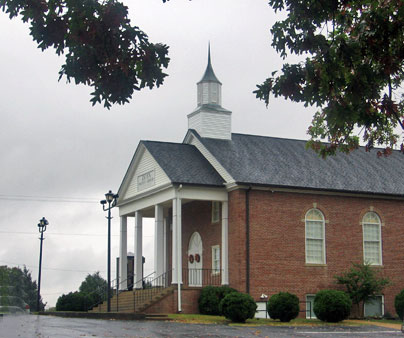





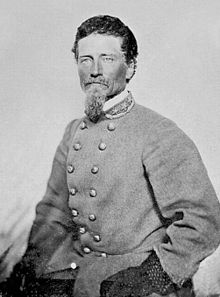
.JPG)
